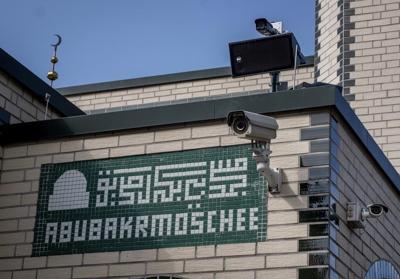BERLIN (AP) — Racism, hatred and sometimes violence against Muslims in Germany are widespread and often part of their everyday experience, according to a new report presented at the interior ministry in Berlin on Thursday.
The Independent Group of Experts on Muslim Hostility worked for three years on the comprehensive report about racism and hostility toward the country's 5.5 million Muslims. The group analyzed scientific studies, police crime statistics and documentation of anti-Muslim incidents by anti-discrimination agencies, counseling centers and nongovernmental organizations.
The report concludes that at least one third of Muslims in Germany have experienced hostility due to their religion. However, the experts pointed out that the real numbers are likely vastly higher since only 10% of Muslims appear to report hostility and hate crimes against them.
“Muslim life belongs to Germany as a matter of course,” Interior Minister Nancy Faeser said in a statement. “This makes the findings of this first comprehensive report on Muslim hostility in Germany all the more bitter."
"Muslims in Germany experience exclusion and discrimination in their everyday lives — right up to hatred and violence,” she added. “It is very important to make this visible and to raise awareness of resentment that is still widespread.”
German Muslims are not only exposed to blunt racism but also to daily stereotyping from kindergarten to old age, the experts said.
The group found that negative prejudice toward the community included “the attribution of widespread, largely unchangeable, backward-thinking and threatening characteristics to Muslims and people perceived as Muslim.”
These stereotypes lead to exclusion and discrimination by Germany's mainstream society which often perceives Muslims as “the others,” even though 50% of Muslims in the country have German passports.
Germany's Muslim community is diverse, with the majority claiming Turkish roots. Others originally emigrated from Arabic countries such as Morocco or Lebanon. Many first came to West Germany more than 60 years ago, when they were recruited as “guest workers” to help the country advance economically.
The first generation of Muslim immigrants were mostly employed in coal mining, steel production and the auto industry. Many who initially came as temporary workers decided to stay and bring their families, giving Berlin, Cologne, Frankfurt and other cities in western and southwestern Germany large immigrant communities.
About 19 million people, or 23% of Germany’s population today, either — not just of Muslim background but also from countries such as Poland, Romania, African or Asian countries, and
The researchers found that Muslim hostility is common in basically every aspect of life from schools to the police, national, regional and municipal agencies, the private job sector, the housing market, the media and politics.
Karima Benbrahim, one of the authors of the study, said that a joint effort is needed by society and its institutions to both make people aware of Muslim hostility and fight it.
“Muslim hostility is something that affects everyone in this society and not just those concerned,” she said.
As an example of anti-Muslim sentiment in education, the authors of the study read excerpts from a political science schoolbook from 2019, which claims that Muslims “want to live better than they do at home, yet they insist on their identity, which includes headscarves, mosques, prayers in schools, forced marriages, oppression of women.”
The book concludes that “for many of them, that is part of their sense of ‘us'. The problem is: It collides with our sense of ‘us’.”
Another author of the study, Kai Hafez from the University of Erfurt, stressed that racism against Muslims is not just prevalent among Germany's far-right fringe, but that the middle of society needs to shed its stereotypical views of Muslims as well.
“It's about time to introduce fundamental, structural anti-racist reforms” in Germany, Hafez added.








































